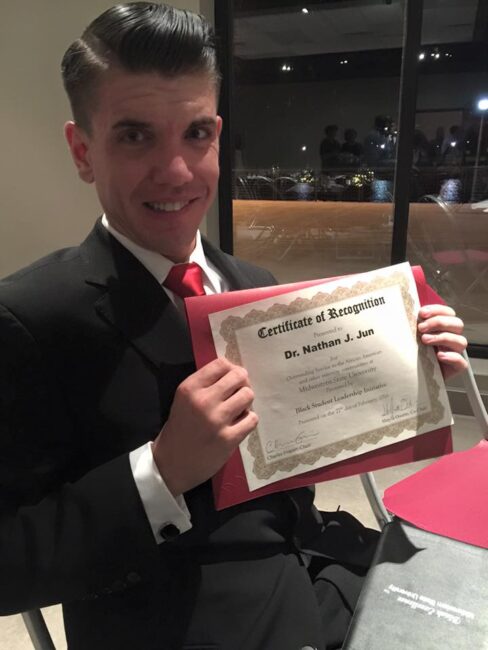Nathan Jun is the Professor of Philosophy at Midwestern State University,
Nathan Jun joins other leading Bestselling Authors, International Speakers & Entrepreneur, taking part in our Leader Roundtable Interview Series. The DotCom Magazine editorial team is delighted to have Nathan join us for our Leader Roundtable Interview.
Nathan Jun graduated with a B.A. in English and Philosophy from Loyola University Chicago in 2001. He subsequently received his M.A. in Philosophy from the University of Pennsylvania in 2003 and his Ph.D. in Philosophy and Literature from Purdue University in 2008. Dr. Jun has been a member of the faculty at Midwestern State University (Wichita Falls, Texas) for the past twelve years. He currently serves as Professor of Philosophy.
A specialist in political philosophy and the history of political thought, Dr. Jun has written extensively on nineteenth- and early twentieth-century radicalism with a particular emphasis on anarchism. He is the author of Anarchism and Political Modernity (Bloomsbury, 2011) and the editor or co-editor of several volumes including Proletarian Days: A Hippolyte Havel Reader (AK Press, 2018), Anarchism: A Conceptual Approach (with Benjamin Franks and Leonard Williams, Routledge, 2018), Brill’s Companion to Anarchism and Philosophy (Brill, 2017), Without Borders or Limits: An Interdisciplinary Approach to Anarchist Studies (with Jorell Meléndez-Badillo, Cambridge Scholars Press, 2013), and New Perspectives on Anarchism (with Shane Wahl, Lexington Books, 2010). He has also published more than three dozen articles, reviews, and book chapters. Dr. Jun is currently working on his second monograph, entitled The Immortal Idea: An Intellectual History of Anarchism, to be published by Routledge. He resides in Wichita Falls, Texas.
Let’s start by telling us about your current position.
I am Professor of Philosophy at Midwestern State University, where I have been a member of the faculty since Fall 2008. Until recently I also served as Coordinator of the Philosophy Program.
Q: Please tell us about your approach to successful teaching.
Philosophy is concerned with the most fundamental questions confronting us as human beings—it is not an easy subject to teach, even under the best of circumstances! That said, I have found that the key to doing so successfully is a combination of Socratic dialogue and close reading of primary texts. I encourage students to interrogate their own beliefs and preconceptions, to ask difficult questions of themselves and others, and to seek answers to those questions using the tools of critical reasoning and analysis.
Q: Please tell us the one thing that distinguishes your approach to teaching from that of your peers.
This is a difficult question to answer, but I pride myself on my passion for the discipline, which I make a point of demonstrating in the classroom. Students respond well to my enthusiasm; it tends to rub off on them!
Q: And to finish this section, please tell us what is the one major key to success as an educator?
It is crucial to understand and respect students’ points of view—to know where they are coming from and meet them there. This is the key to getting (and keeping) students engaged in the subject matter.
Q: For our readers who are considering working in higher education, what advice can you give to aspiring academics?
Cultivate a strong work ethic. In your role as teacher, scholar, and professional, never settle for less when you can do more. Set high standards for yourself and hold to them.
Q: What is your advice for dealing with professional challenges?
It always helps me to reflect on the “why” of whatever I am working on. Am I doing this because I want myself to impress others, or because I genuinely care about my vocation? Every once in awhile we need to remind ourselves why we ended up pursuing this line of work in the first place, and why it matters to us.
Q: In today’s busy and fast-changing world, how do you stay informed and organized?
Read, read, and plan! I keep a large notebook full of things I plan on getting done, fully equipped with sticky notes, highlighters, and pens for jotting quick lists. Reading is essential to staying informed and alert about what goes on in the world. Although our cell phones and tablets can be useful in this regard, I prefer turn a few pages and write things down as much as possible.
Q: What is your “Why”? In one sentence, why do you get up in the morning?
I wake up with the idea that this day will never be like the day before, or a day ten years from now. The mystery and openness of what today holds keeps me eager to learn about myself and the world I inhabit.
Q: In one sentence, what is the most important thing one must do to be a great leader?
A great leader must be empathic and open to change.
Q: In one sentence, describe how important your students are to you.
My students are the reason I do what I do, and strive to do it well.
Q: In one sentence, describe a positive way that technology can make the world a better place.
Technology is a hotly debated topic, but I think it is at its best when it helps people connect with each other and find a sense of community.
Q: In one sentence, tell us something positive to motivate our readers.
It is not over yet; you still plenty of fight left in you.
Q: In one sentence, tell us how you start your day to get ready.
I read the news with a cup of coffee.
Q: In one sentence, describe how you handle rejection and setback.
I strive to see rejection as an opportunity for growth and improvement.
Q: In one sentence, describe how you keep your sanity in a competitive environment.
Take a break once in awhile to do things you enjoy!
Website
http://www.nathanjun.com/
LinkedIn
linkedin.com/in/nathan-jun-8054671b8
Nathan Jun, thank you so much for participating in the DotCom Magazine Leader Roundtable Interview Series. We appreciate you participating in this important roundtable interview series. We wish you, your family, nothing but the best.






















